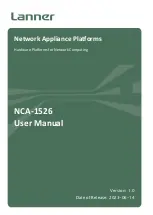
14.1.2.11.1 Connection with Server
280
It is not possible to configure an individual passphrase if the peer
has been configured for a dynamic IP. The same passphrase
applies to all preshared key connections on this interface with
dynamic IPs involved. This special key is configured on the
previous menu level on tab "Dynamic peer setup".
Remote ID (with CA based authentication)
For IPSec server connections authenticated by a trusted CA's certificate it is highly
recommended to restrict the connection to a specific peer ID. Otherwise the owner of
any certificate issued by the trusted CA would be able to impersonate the server. The
remote ID is mandatory for peers with static IP. If you don't know the peer's ID, you can
find it in the logs after an attempt of the peer to establish a VPN connection with SX-
GATE. Certificate data (i.e. a Distinguished name, DN) is expected as the peer's ID. It
is not possible to enter an IP address or DNS name as ID here.
This setting must be adjusted whenever the peer changes its
ID, e.g. because it received a new certificate and the new
certificate's DN differs from the old one.
Import public key
Here you can specify the public key of the peer. If the peer's certificate was issued by
the local SX-GATE CA, you can copy it from there. Otherwise you have to import the
public key from a file in PEM format.
You have to import the public key of the peer's VPN server
certificate and not the public key of the issuing Certification
Authority (CA).
14.1.2.11.1-C
Phase 1
Rekeying of IKE communication every
Select the period of time after which the Internet key exchange servers have to
negotiate a new session key for encrypting the messages passed between them.
IKE-Proposals
A phase 1 proposal combines a cipher with a hash algorithm and a Diffie-Hellman
group. It is used to secure the communication between two IKE servers.
















































